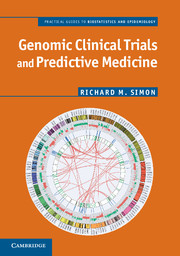Book contents
- Frontmatter
- Contents
- Acknowledgments
- Introduction
- 1 Clinical Trial Basics
- 2 Actionable Prognostic Biomarkers
- 3 Phase II Designs
- 4 Enrichment Designs
- 5 Including Both Test-Positive and Test-Negative Patients
- 6 Adaptive Threshold Design
- 7 Multiple Predictive Biomarkers
- 8 Prospective–Retrospective Design
- Appendix A Statistics Background
- Appendix B Prognostic Classifiers Based on High-Dimensional Data
- References
- Index
1 - Clinical Trial Basics
Published online by Cambridge University Press: 05 February 2013
- Frontmatter
- Contents
- Acknowledgments
- Introduction
- 1 Clinical Trial Basics
- 2 Actionable Prognostic Biomarkers
- 3 Phase II Designs
- 4 Enrichment Designs
- 5 Including Both Test-Positive and Test-Negative Patients
- 6 Adaptive Threshold Design
- 7 Multiple Predictive Biomarkers
- 8 Prospective–Retrospective Design
- Appendix A Statistics Background
- Appendix B Prognostic Classifiers Based on High-Dimensional Data
- References
- Index
Summary
We will present here a brief review of some of the key aspects of therapeutic clinical trials. In oncology, clinical trials are often categorized into phase I, phase II, and phase III trials. Phase I trials are conducted to determine the maximum dose at which a new drug can be delivered in a defined schedule of administration before dose-limiting toxicity occurs. Phase I trials may also evaluate the pharmacokinetics of the drug administration schedule and the pharmacodynamics of whether the drug inhibits its molecular target. Phase II trials are conducted to identify whether a new drug has antitumor activity when administered as a single agent or whether it contributes to the antitumor activity of other drugs. Phase II trials are traditionally conducted in patients with a particular histologic diagnosis and stage of disease. Traditionally, phase II trials of chemotherapeutic drugs are conducted in a wide range of types of cancer to screen for activity sufficiently great to warrant a phase III trial. With the advent of molecularly targeted drugs, an increasingly important objective of phase II trials is to develop a pretreatment biological measurement, that is, a biomarker, that can be used to identify the patients whose tumors are the most likely to benefit from the drug. Phase II trials do not generally establish the medical utility of a new drug or new regimen; that is the role of phase III trials. Phase II trials generally use an intermediate end-point that reflects antitumor activity but has not been established as a valid measure of patient benefit. The phase II trials determine whether the new drug is sufficiently promising to evaluate in a larger phase III trial and, if so, what the target population should be and how the new drug should be administered.
Phase III clinical trials are generally large studies in which patients who satisfy predefined eligibility criteria are randomized to receive either the new regimen or a control regimen, usually representing a standard of care. There is generally a primary end-point, or measure of effectiveness, that represents a direct measure of patient benefit such as survival or survival without evidence of disease. The end-point is the same for both the new treatment being evaluated and the control, and great care is taken to plan follow-up surveillance of the patients so that the end-point can be evaluated equivalently for the two treatment arms.
- Type
- Chapter
- Information
- Genomic Clinical Trials and Predictive Medicine , pp. 1 - 6Publisher: Cambridge University PressPrint publication year: 2013



